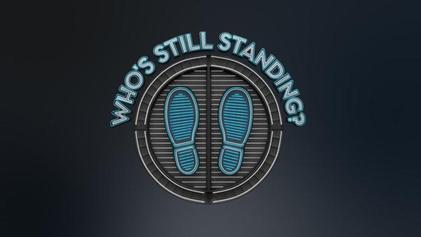 |
Thanks for Playing! |
|
||
|
|
||||
|
MONDAY | TUESDAY | WEDNESDAY | THURSDAY | WEEKEND | PRIMETIME | SCHEDULE | ARCHIVES: 30 90 | WLTI | STATE OF PLAY | ABOUT |
||||
|
Previous Columns: |
|
Copyright
Statement Powered by 1&1 Internet |
 with Chris Wolvie |
| Who's
Still Standing? Dropping Contestants Like They're Hot |
Why
is this person "losing it"? Why does this one feel so defeated?
Why is this one trembling with fear? They're all about to fall through
the floor! This is high-stakes trivia! This is... SHOW:
Who's Still Standing? SHOW:
Who's Still Standing?AIR DATES: December 19, 2011 to January 30, 2012 CREATOR: Lissa Shiloach PACKAGER: Smart Dog Media; Armoza Formats; Universal Media Studios; NBC Universal TV Studio HOST: Ben Bailey WATCH IT HERE: YouTube If you're like me (and I know I am), you watched GSN during its "original series" heyday. And, like me, you REALLY liked "Russian Roulette". Well, in the early 2010s, someone in Israel who must've likewise been a fan decided to expand the idea into "La'uf al HaMillion" where ELEVEN people stand on trap doors waiting to be dropped like a summer game show series after its initial run. The company then sold the rights of the show to NBC who, during the holidays of 2011, turned it into "Who's Still Standing?", a fast-paced trivia show where losers get a short drop and a sudden stop (on padding beneath the stage). The difference is that ONE person is out to drop ten others to win a million...whereas whoever makes that one person tank only gets $10,000. HOW WAS IT PLAYED? One contestant (the "Hero") stands on a trap door in the middle of the stage. Surrounding them are ten other contestants ("Strangers"), also on trap doors. The Hero picks a Stranger with whom to go into a one-on-one trivia battle. The one who loses has the trap door beneath them opened. The Stranger chosen starts each round. The host asks a trivia question and the answer is shown in an unfinished "Wheel of Fortune" manner; spaces show the word(s) in the answer with a few filled in with letters. They have 20 seconds to come up with the right answer. If they do, control goes to the Hero and another question is asked. This goes back and forth until one of them doesn't answer right within the time limit. The Hero is issued two Passes at the start of the game, which must carry them through at least five Strangers. At anytime, the Hero can Pass the question to the Stranger, who gets a new 20-second clock to answer. The Strangers cannot Pass; they must answer each question given to them. If the Stranger loses the battle, they are dropped and the Hero gets money added to his pot, based on how the producers thought the difficulty would be for the Hero to win. The value is usually between $10,000 and $20,000. The Hero then chooses a different stranger and the process continues. After five Strangers drop, the Hero is given the chance to walk away with the money they've accumulated or stay and play for more. If they stay, they're given one more Pass for the rest of the game and is given the chance to leave after every consecutive Stranger dropped. After the eighth Stranger is dropped, the Hero can leave with a set amount of $250,000. After the ninth, it's $500,000. If the Hero drops all ten Strangers, the Hero leaves with $1,000,000. The Hero, upon leaving with whatever amount they leave with, gets the choice to just walk out of the studio...or drop through the trapdoor just for fun. If, at any time, the Hero drops, the Stranger who the Hero was facing gets $10,000 ($25,000 if they're among the last three and $50,000 if they're the last Stranger). The remaining Strangers then play a Speed Round. One by one, they're asked questions in the same fashion, but with only TEN seconds to answer. A correct answer puts $1000 in a jackpot (later $2000). A time-out drops the Stranger through the trap door. The last Stranger standing gets whatever's in the jackpot. Most times, the Speed Round isn't aired; for those curious, it's posted on the show's website. WHAT WORKED? Again, if you have to crib, crib from on of the best. And even BETTER if hardly anyone's HEARD of the "best". Not saying there aren't a lot of GSN watchers but network TV has not seen anything like "Russian Roulette" so I'm sure they were "wow"ing quite a bit at the concept. It's kind of a mild throwback to 80s Nickelodeon game shows they used to watch...without the slime, of course. Having never seen "Cash Cab", I was pleasantly surprised how well Ben Bailey did as host. And I can see why his name was thrown around to replace Alex Trebek on "Jeopardy!" a few years back. He kept the show moving, acted as excited as the contestants and really seemed to connect with them. Makes sense that a comedian would host such a funny show.. WHAT DIDN'T WORK? MY main issue was the inequality when it came to what the Hero and the Strangers won. I can understand that the Hero has to KO ten people while the Stranger needs only one. But, if the pot the Hero built is over $10,000, why not have the remaining Strangers fight for THAT instead a measly $1000 per right answer in the Speed Round? Even HALF of it would be nice. And, when it gets to the final three, have them play for $100,000 or the such. The show was canceled due to "high production costs"...which is odd because "Russian Roulette" ran a fair clip with not even CLOSE to the budget NBC had. Sure, the lighting and the larger set may have been a bit overkill but they could've gone longer. I think the "holiday marathon" did them in and "too much of a good thing" over too short a time caused people to get numb to the awe-factor quickly. Good show...but should've gone weekly from the get-go. WOULD IT WORK TODAY? Probably would...though only the original Israeli version is still going today. No matter the show, a great concept will turn stale in today's market if you show it more than once a week. Production costs be damned; you want to MAKE money with a good show, you have to SPEND money on a good show. NEXT TIME: Tick tock, the Quiz is a clock... Chris Wolvie's still standing better than he's ever been. Follow him on Twitter @ChrisWolvie and e-mail him at chriswolvie@yahoo.com. |
|
|